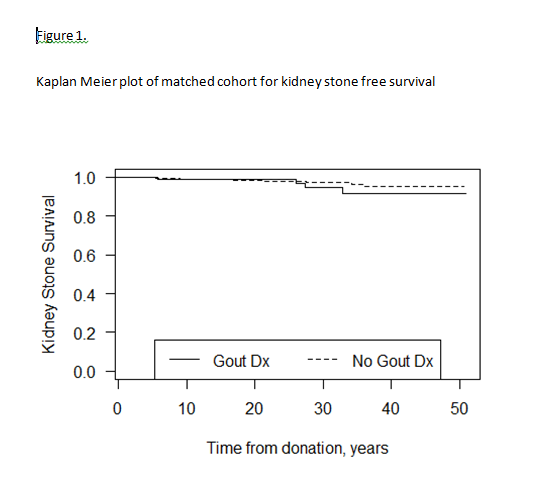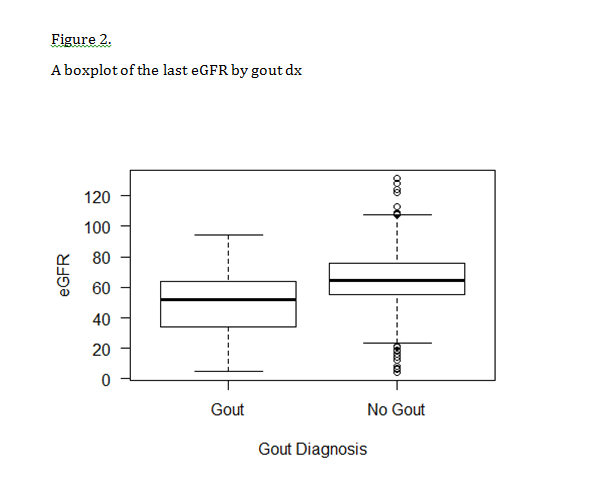Impact of Post Kidney Donation Gout on eGFR and Kidney Stones.
Surg, Biostats, UMN, Mpls, MN
Meeting: 2017 American Transplant Congress
Abstract number: A232
Keywords: Donation, Kidney, Renal function
Session Information
Session Name: Poster Session A: Living Donor Kidney Transplant I
Session Type: Poster Session
Date: Saturday, April 29, 2017
Session Time: 5:30pm-7:30pm
 Presentation Time: 5:30pm-7:30pm
Presentation Time: 5:30pm-7:30pm
Location: Hall D1
Compared to matched non donor controls, living kidney donors have a higher rate of hyperuricemia early post donation (Kasiske,Am J Kidney Dis,2016) and a higher incidence of gout late post donation (Lam,Am J Kidney Dis,2015). We studied the impact of post donation gout on development of kidney stones and on long-term renal function. Donors at our center are surveyed Q3 years regarding development of medical problems and on renal function. 1610 donors had a specific statement about the presence or absence of gout (1523 without gout; 87 with gout). A stratified Cox Regression was used to evaluate the time to kidney stones from transplant, stratified by 5-year age group, gender, ethnicity (Hispanic/Latino, Non-Hispanic/Non-Latino, or Unknown), and 3-year transplant year categories. Patients with a gout diagnosis during the follow-up time period were categorized into the gout group regardless of the timing of the gout diagnosis. The timing of the kidney stone event was collected from health surveys and imputed when only the month and year or year were provided by using the 15th of the month and June 15th of the year, respectively. The latest estimated GFR (eGFR) for each patient was computed using the CKD-EPI method and compared using a linear model with an indicator for gout adjusted for the stratifying variables: 5-year age group, gender, ethnicity, and 3-year transplant group. For the 87 with gout, mean time to gout was 23 years (25%-75%: 15.8-30.2 years); median, 24 years. We found no difference in the incidence of postdonation kidney stones in those with compared to those without gout (Figure 1). However, latest eGFR for those without gout was 11.8mL/min/1.73 m2 higher compared to those with gout [95% CI: 8.4 – 15.1, p < 0.001]. CONCLUSION: There is no increased risk of kidney stone disease in donors who developed gout subsequent to donor nephrectomy. There was an association between development of gout and reduced kidney function.

CITATION INFORMATION: Sengupta B, Menk J, Matas A. Impact of Post Kidney Donation Gout on eGFR and Kidney Stones. Am J Transplant. 2017;17 (suppl 3).
To cite this abstract in AMA style:
Sengupta B, Menk J, Matas A. Impact of Post Kidney Donation Gout on eGFR and Kidney Stones. [abstract]. Am J Transplant. 2017; 17 (suppl 3). https://atcmeetingabstracts.com/abstract/impact-of-post-kidney-donation-gout-on-egfr-and-kidney-stones/. Accessed January 31, 2026.« Back to 2017 American Transplant Congress
